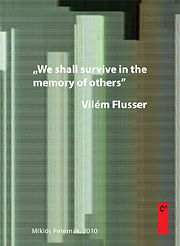He is the one who best described how photography accelerated the way we think by allowing us to access the microchronology of daily life, until we were industriously and industrially speeding up production process to keep up with our accelerated consciousness. When, WWI shocked everyone over the scale of slaughter which mechanized ideology could execute, the machines seemed to, as Flusser would say, "spout" history.
As the smoke began to clear, they plowed the war dead into neat memorial garden rows, and claimed "we humans are better than that", cried "never again!" and they believed it. And there was a socialist bouillonnement in Europe which tried to take care of the root problems and misconceptions which allowed simple scientific truth to be so misapplied.
Yet some how, it happened again, and this time around the world, and this time including that which is most offensive to anyone who implicates himself in the least notion of humanism, the industrial death camps of the Germans, and the instantaneous mass slaughter, of the atomic weapons dropped by Americans.
Western thought has never recovered from the shock, but technology can't help itself, nobody dares to pull the plug. Technology causes more problems than it solves, but it does solve them all eventually, except the one that it causes more than it solves, and that these problems seem to be increasing in destructive power.
Public Emotion from b gottlieb on Vimeo.
catastrophe
1540, "reversal of what is expected" (especially a fatal turning point in a drama), from Gk. katastrephein "to overturn," from kata "down" + strephein "turn" (see strophe). Extension to "sudden disaster" is first recorded 1748.
"Le progrès et la catastrophe sont l'avers et le revers d'une même médaille"- Hannah Arendt, oft quoted by Paul Virilio "Progress and Catastrophe are two sides of the same coin", we won't get one without the other. Virilio insists that he does not proclaim the apocalypse, and sees only hope in the finitude, the limits, mortal, and other, of humanity which are revealed with every catastrophe. We expect the best, but suddenly, there is an accident, and this reveals the real best, different but as good as that which we expected.
__what follows is an excerpt from from an interview with Virilio published in Le Monde on February 2nd, 2009
Gérard Courtois et Michel Guerrin: Croyez-vous, comme certains, que le capitalisme touche à sa fin ?
Paul Virilio : Je pense plutôt que c'est la fin qui touche le capitalisme. Je suis urbaniste. Le krach montre que la terre est trop petite pour le progrès, pour la vitesse de l'Histoire. D'où les accidents à répétition. Nous vivions dans la conviction que nous avions un passé et un futur. Or le passé ne passe pas, il est devenu monstrueux, au point que nous n'y faisons plus référence. Quant au futur, il est limité par la question écologique, la fin programmée des ressources naturelles, comme le pétrole. Il reste donc le présent à habiter. Mais l'écrivain Octavio Paz disait : "L'instant est inhabitable, comme le futur." Nous sommes en train de vivre cela, y compris les banquiers.
Gérard Courtois et Michel Guerrin: Do you believe, as do some, that capitalism is coming to an end?
Paul Virilio: I rather think that it is the end which is coming to capitalism. I am an urbanist. The Crash shows the earth is too small for progress, for the speed of history. From which [we get] the repetitive accidents. We used to live in the conviction that we had a past and a future. But the past doesn't happen, it has become monstrous, to the point where we no longer refer to it. Whereas the future is limited by the question of ecology, in the programmed end of natural resources, like oil. This leaves only the present for us to live in. But the writer Octavio Paz said "the immediate is uninhabitable,as is the future". We are living this now, the bankers included.
PS. corollary in today's Wall Street Journal from Granta's John Freeman. The fact that this call to eschew email and forgo all indulgence in the increasing panoply of light-speed communication is being published in the WSJ must mean that it is (and perhaps Granta itself (representing literary traditional intellectual/left critique) has become)not only hopelessly out of touch, but probably, likely through their trust-fund investments, so hopelessly ensnarled in the thing they wish to critique that they can only produce counter-intelligence for the disaster management industry. We probably need more of this.
Or this.













No comments:
Post a Comment